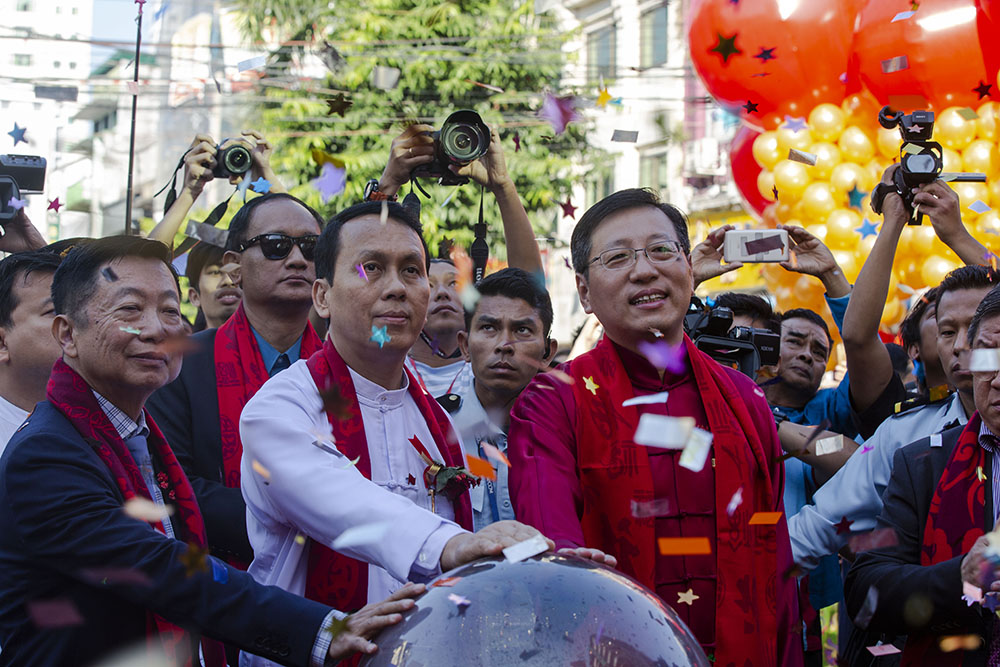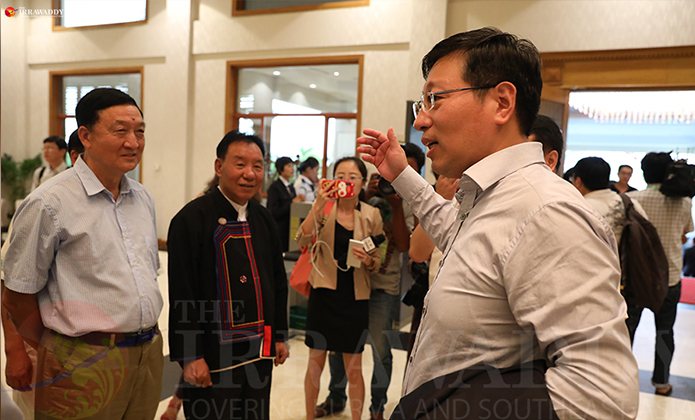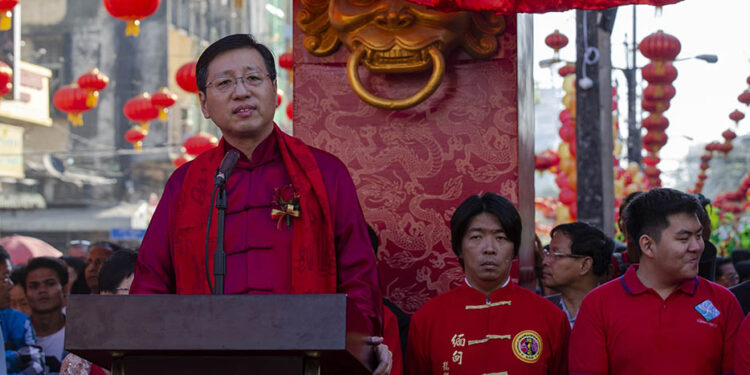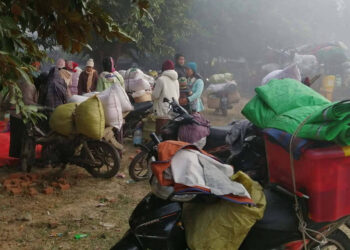YANGON—It has been a busy week for the Chinese ambassador to Myanmar. Just a week after Beijing hosted the 2nd Belt and Road (BRI) forum, Hong Liang has been bustling around the government offices in Naypyitaw attending a series of meetings since Monday.
So far, he has met with President U Win Myint, Electricity and Energy Minister U Win Khaing and the Parliamentary speakers. He is expected to meet with State Counselor Daw Aung San Suu Kyi, as well as with other ministers and senior officials in the capital. At the meetings he has held so far, the 50-year-old ambassador has recapped and reaffirmed the agreements reached between China and Myanmar over the past four years, and touted the countries’ joint achievements. Then he has made his farewells, saying goodbye to everyone he has met, wishing them luck and thanking them for their hospitality.
Hong Liang is leaving. Very soon, he will become the 19th Chinese ambassador to bid farewell to Myanmar upon completing his duties.
As of Wednesday, the Chinese Embassy in Yangon still hadn’t officially announced his departure, but the country’s state-run media recently began referring to him as the “outgoing ambassador”.
Hong officially became the ambassador to Myanmar—the curriculum vitae published on the Chinese Embassy’s website describes his position as “Ambassador Extraordinary and Plenipotentiary of China to Myanmar”—in July 2015, under the previous government. Eight months later he witnessed the Daw Aung San Suu Kyi-led National League for Democracy come to power and form a government after the general election.
His nearly four-year tenure under the NLD government has been eventful. He has been involved in BRI-related projects between China and Myanmar such as the signing of the MoU for the China-Myanmar Economic Corridor and Kyaukphyu Special Economic Zone, and an agreement to conduct a feasibility study for the Muse-Mandalay railway as well as a framework agreement for the New Yangon City Development.

But the general public in Myanmar will mostly remember him as a pushy figure who aggressively lobbied for the resumption of the controversial Chinese-backed Myitsone mega dam project, which has been halted since 2011 over nationwide public criticism due to environmental and other concerns.
The negative sentiment toward the Myitsone project came under the spotlight again when Hong claimed after a visit to Kachin State at the end of December that the Kachin people were not opposed to the dam’s resumption. Later, the prominent Kachin parties objected and said the claim was “inaccurate and misleading.”
Gumgrawng Awng Hkam, the president of the Kachin Democratic Party, and Rev. Hkalam Samson, the president of the Kachin Baptist Convention, both of whom met with the Chinese ambassador at the time, told The Irrawaddy that Hong briefed them in a bossy manner. They felt threatened by the ambassador, who also warned them not to oppose the Myitsone Dam and not to make close friendships with Western diplomats, otherwise they “would face serious consequences.”
Apart from warning people whom they shouldn’t make friends with, Hong was also known for telling people where they should and should not go in Myanmar.
In early 2016, a few months after his appointment, Hong repeatedly urged then U.S. Ambassador Derek Mitchell not to travel to rebel-infested Kachin State or eastern parts of Shan State along the China-Myanmar border, where Beijing has an influence on the ethnic armed groups, saying the U.S. “should respect China’s interests.”
Closer to his second home in the former capital, the Chinese ambassador seemed to have a good relationship with Yangon Region Chief Minister U Phyo Min Thein.
When the chief minister embarked on his so-called reform of the Yangon public bus system in 2017, Hong helped arrange the purchase of 1,000 new buses from Chinese companies Yutong and Ankai at a total cost of US$56 million (85.4 billion kyats). Yangon Planning and Finance Minister U Myint Thaung told the regional parliament the ambassador guaranteed that the quality of the products and the price of vehicles were reasonable.

Furthermore, the following year, when New Yangon Development Company—the sole developer of the controversial New Yangon City—was launched, the Yangon chief minister said, “Special thanks go to the Chinese ambassador and other diplomats” for their help in realizing the project. One month later in May, China Communications Construction Company Ltd. (CCCC) signed a framework agreement with the Yangon government for the preparation and submission of a detailed proposal to provide infrastructure work related to the first phase of the development of the project.
However, due to the long list of controversies connected with CCCC, New Yangon City is attracting mounting public concern and criticism. The controversies surrounding the firm involve alleged fraud, corruption and bribery in many other countries where it has implemented similar development projects.
No picture of Hong’s time as ambassador would be complete without an account of his relationship with the ethnic armed groups over which China wields influence, especially in northern and eastern Myanmar along the border with China.
Since 2017, China has acted as a peace broker between the military and the Northern Alliance—the Kachin Independence Army, Arakan Army, Ta’ang National Liberation Army and Myanmar National Democratic Alliance Army—all of which are members of the Federal Political Negotiation and Consultative Committee.
People close to the ethnic armed groups said the ambassador’s bossy manner and poor communication skills annoyed the Northern Alliance members during informal meetings.
On one occasion, Hong’s brash demeanor upset the armed groups’ representatives, including the Kachin side, leading not only to disagreements over the matter being discussed but also to a postponement of the meeting and the sudden departure of another senior Chinese official.
The Chinese Embassy in Yangon didn’t reply to The Irrawaddy’s requests on Tuesday and Wednesday for the ambassador’s comment on his accomplishments and failures during his time in Myanmar, or on the identity of his successor.
Ethnic affairs and China analyst U Maung Maung Soe said Hong will likely earn praise from Beijing for his efforts on behalf of the Chinese government’s policies in Myanmar.
“But his biggest failure in Myanmar is the way he handled the revival of the Myitsone Dam. His actions only inflamed public resistance, which is not a good sign for China-Myanmar relations.”
Another analyst, Daw Khin Khin Kyaw Kyee, the head of the China desk at the Institute of Strategy and Policy (ISP)-Myanmar, said the outgoing ambassador’s two most visible achievements were his efforts to promote Chinese New Year celebrations in Yangon for two years in a row, which included an official ceremony that saw Chinatown adorned with red paper lanterns, and his frequent donations to social activities.
“However, his action over the Myitsone Dam severely damaged China’s image among the public,” Daw Khin Khin Kyaw Kyee said.
“The lesson from Myitsone is that he should have made more of an effort to understand the public’s will. He should have listened more to voices on the ground. When it comes to ‘public diplomacy’, it should not be one-way communication; it should be a two-way interaction,” she said.

















